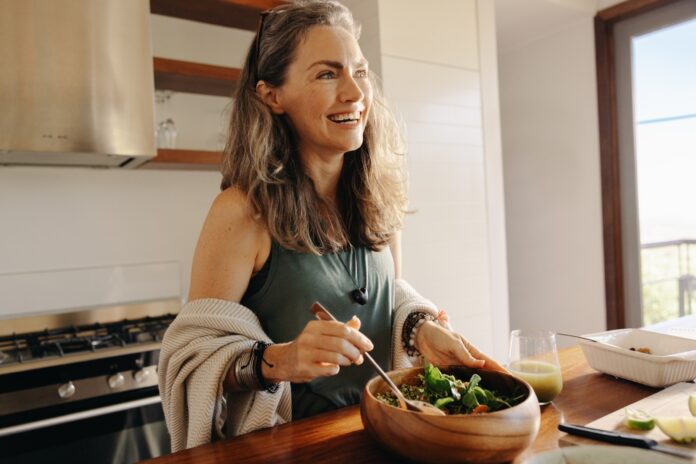Eating a vegan or vegetarian diet may sound like a young, trendy habit. However, experts suggest that eating mostly plant-based has health benefits.
Diets rich in plant-based foods are more likely to meet senior nutrient requirements such as fiber. The best part? These nourishing plants promote health and can actually be quite simple to incorporate into your diet.
Discover the potential benefits of a plant-based diet for seniors, followed by a 7-day meal plan for vegetarians to get you started.
What Is a Plant-Based Diet for Seniors?
While there is no universal definition of plant-based diets, most plant-based eating patterns focus on foods that come from plants (as opposed to animal products). Plant-based diets are generally built using lots of plant-based foods, including legumes, fruits and vegetables, and grains.
Among the plant-based eating patterns, there are many options. In fact, within vegetarianism, there are many different types. Some people choose to eat certain animal-based products while others don’t.
The following distinctions can help you decide what diet might be right for you:
- Vegan diet: Avoids all animal-based products, including meat, eggs, milk and dairy products
- Vegetarian diet: Limits or avoids meat and many animal products
- Pescatarian: Avoids meat but eats fish
- Lacto-ovo vegetarian diet: Consumes milk, dairy products, and eggs
- Lacto-vegetarian diet: Consumes milk and dairy products
- Flexitarian diet: Focuses on plant-based eating and limits intake of foods like red meat
The lengths to which you go to eat plant-based are entirely up to you and are generally a matter of personal preference. Vegan diets are often considered the most “strict” of the above-listed diets. Some vegans go as far as not eating honey to avoid animal-based byproducts.
Flexitarians are on the other end of the spectrum, as you might have been able to guess by the word “flexible” being worked into the name. This more flexible eating pattern suggests eating plant-based meals most of the time, such as any time you cook at home. It’s considered a less restrictive vegetarian diet that can account for unique needs and may be more suitable for seniors.
Going vegetarian, even one day a week, may make a difference in your diet. For example, some people practice “Meatless Mondays” as a way to get more familiar with plant-based recipes.
Benefits of a Plant-based Diet for Seniors
Beyond personal preference, religious beliefs, or ethical reasons, many people choose to eat more plant-based because of health concerns. Plant-based eating patterns and vegetarian diets have been associated with improved health outcomes in many areas.
In fact, entire diets based on plants, like the MIND diet, were designed with improved health outcomes in mind. In general, eating more plant foods reduces the risk of developing:
- Alzheimer’s disease
- Certain cancers
- Diabetes
- Heart diseases
- High blood pressure
- Insulin resistance
- Obesity
- Stroke
Overall, plant-based diets tend to be lower in calories and saturated fat and higher in nutrients like fiber, vitamins, and minerals. Plant-based diets are also thought to support better gut health, thanks to various “good” bacteria provided by plant foods. Increased levels of fiber in the diet may also promote better digestion
Interestingly, vegan diets have also been linked with longevity. In other words, future studies on a 50 year-old vegan vs meat eater may confirm that the plant-eater lives longer.
Outside of optimal body health, some people eat plant-based food for the planet. Often, animal foods require more processing, which can result in a higher risk of pollution to the environment.
Risks of Going Plant-Based
Like any eating pattern, consuming mostly plant-based foods comes with risks. In general, animal-based foods contain higher or more bioavailable levels of:
- Calcium
- Iron
- Protein
- Vitamin A
- Vitamin B12
- Zinc
In other words, plant-based eaters may be more prone to certain vitamin and mineral deficiencies. In particular, a diet low in dairy products means plant-eaters may also be at risk for calcium deficiency. Calcium is a crucial nutrient for bone health, and seniors who don’t consume enough may be at heightened risk for fractures or falls.
Unfortunately, many store-bought plant-based products aren’t necessarily “healthy.” For example, chips and Oreos may be “vegan,” but they aren’t always considered “healthy” choices. For taste, many commercial meat-free foods contain additives, including added sugar, saturated fat, and salt. Some labels are even misleading since the main dish may be meat-free, but foods like lard are used to add fats during the cooking process.
Working with a dietitian can minimize the risk of nutrient deficiencies by recommending certain supplements. They can also help you learn how to look out for unwanted additives on a nutrition label or in an ingredients list. Dietitians can also provide meal ideas so that eating mostly plant-based doesn’t become boring.
7-Day Meal Plan for a Senior Vegetarian
If you’re just starting with plant-based eating, the following meal plan can help.
Day 1:
- Breakfast: scrambled egg alternative (2 ounces of firm tofu, cubed, sauteed and slightly smashed for “scrambled” appearance), seasoned with turmeric, nutritional yeast, and salt for color and flavor + 8 oz glass of fortified soy milk
- Lunch: leafy green salad with kale and vegetables, fruits, chopped nuts of choice and vinaigrette
- Dinner: Southwestern-style baked sweet potato (topped with black beans, sliced green onions, sliced avocado, and choice of sauce or salsa)
- Snack: chopped vegetables (i.e. celery, carrots, cucumbers) and whole grain crackers with hummus
Day 2:
- Breakfast: whole grain cereal + vitamin D and calcium-fortified orange juice
- Lunch: lentil and bean-based chili with corn chips or tortilla strips as a topping + corn muffin
- Dinner: sauteed Swiss chard, seasoned with garlic and cooked in 1- 1 ½ Tbsp olive oil + brown rice + Portobello mushroom “steaks”
- Snack: Homemade muffins (made with chia seed or flax seed egg alternative as a binding agent)
Day 3:
- Breakfast: oatmeal, topped with fruit of choice, nut butter, and sweetened with 1 Tbsp maple syrup (as desired) + fruit smoothie
- Lunch: Vegetarian “BLT” sandwich (made with whole grain bread, vegetarian “bacon”, lettuce, and tomatoes) + pickle on the side + baked potato chips
- Dinner: calcium-set tofu stir-fry with broccoli, bok choy, bell peppers, and peanut sauce (served atop parboiled white rice or other grain of choice)
- Snack: edamame
Day 4:
- Breakfast: buckwheat banana pancakes, made with egg alternative as needed (1 Tbsp margarine and 1 Tbsp maple syrup as topping, if desired)
- Lunch: Mediterranean-style spinach salad, with choice of toppings (such as chickpeas, olives, sun-dried tomatoes, olive oil, and herbs)
- Dinner: grilled eggplant + side of ½ cup roasted carrots + mashed potatoes (made with olive oil, herbs, and 1 Tbsp margarine)
- Snack: 1 medium apple + 2 Tbsp nut butter of choice (i.e. almond butter, peanut butter)
Day 5:
- Breakfast: blueberry millet breakfast bake
- Lunch: 1 cup low-sodium vegetable soup + whole-wheat roll
- Dinner: mango salsa + 3 oz salmon (or a black-bean burger patty for non-pescatarians)
- Snack: almonds + sliced fruit of choice
Day 6:
- Breakfast: whole wheat bagel + non-dairy cream cheese + fruit salad
- Lunch: bean burrito
- Dinner: whole-grain pasta with tomato sauce + asparagus on the side
- Snack: ¼-½ cup homemade trail mix (with unsalted nuts and seeds, and unsweetened dried fruit)
Day 7:
- Breakfast: Avocado toast (toasted whole-wheat or whole-grain bread, topped with mashed avocado and herbs and seasonings as desired) + dairy-free yogurt topped with homemade granola
- Lunch: Peanut butter and jelly sandwich (made with whole-wheat or whole-grain bread, 1 Tbsp peanut butter, 1 Tbsp jelly) + 1 medium orange
- Dinner: Vegetarian enchiladas
- Snack: Acai bowl with choice of toppings (i.e. berries, nuts and seeds, shredded coconut flakes, etc.)
Searching for a different solution? Meal delivery makes mealtime much easier, and Silver Cuisine has vegetarian options designed especially for seniors.
In Summary on Plant-Based Diet for Seniors
Plant-based diets, especially flexitarian eating styles, can be suitable for seniors. While certain vitamins and minerals may be missing from a plant-based diet, on the whole, eating more grains, fruits, vegetables, and legumes is associated with lowering disease risk.
Even eating one vegetarian meal a week may have health benefits, and options like vegetarian meal delivery services can make healthy, plant-based eating easier.
References:
Baden MY, Shan Z, Wang F, Li Y, Mason JE, et al. Quality of Plant-Based Diet and Risk of Total, Ischemic, and Hemorrhagic Stroke. Neurology. 2021;96(15).
Caspero A, Klemm S. Building a Healthy Vegetarian Diet: Myths and Facts. Eatright. Published October 2021.
Domić J, Grootswagers P, van Loon LJC, de Groot LCPGM. Perspective: Vegan Diets for Older Adults? A Perspective On the Potential Impact On Muscle Mass and Strength. Adv Nutr. 2022;13(3):712-725.
Ellis E. Vegging Out: Tips on Switching to a Meatless Diet. Eatright. Published February 2020.
Encyclopedia of Food Chemistry. Animal-Based Food. ScienceDirect. Published 2019.
National Heart, Lung, and Blood Institute. Lacto-Ovo Vegetarian Cuisine. Nhlbi.nih.gov. Accessed March 2023.
National Institute on Aging. What Do We Know About Diet and Prevention of Alzheimer’s Disease? Nia.nih.gov. November 2019.
Norman K, Klaus S. Veganism, aging and longevity: new insight into old concepts. Curr Opin Clin Nutr Metab Care. 2020;23(2):145-150.
Ryan M. Going Meatless Once a Week. Eatright. Published March 2021.






